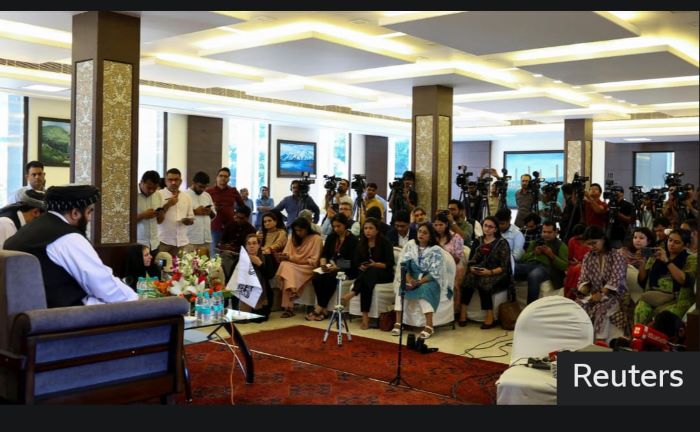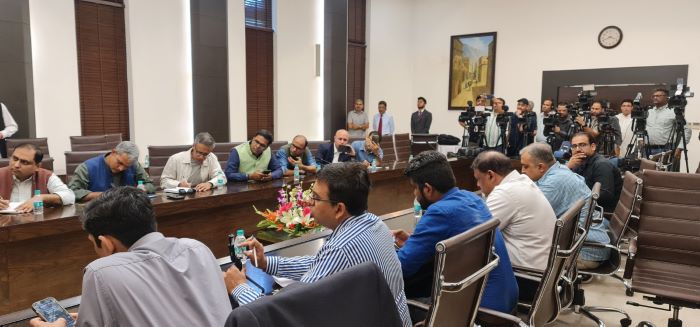It took public outrage, social media storming, political opposition—even pleas from professional bodies—for the Afghan side to arrange a second, inclusive and damage control press conference by the visiting Afghanistan Foreign Minister Amir Khan Muttaqui, a follow up to the October 10th one. That ‘inclusivity’ came only in response to criticism, not out of proactive adherence to equality. Held on Oct 12 at the embassy premises it was a message to clear the understanding that the Taliban regime in Afghanistan was mirroring its stand on women rights in Afghanistan on the Indian soil as well.
For background, a PC of Muttaqi was held at the Afghan embassy which had only invited male journalists. Women journalists were barred from entering. When MEA was asked about its knowledge of the discrimination, a statement issued by the ministry said, ‘MEA has no role in the PC’. It was enough to solicit askance from women scribes who had written and reported on foreign affairs and diplomacy since ions as to did the Ministry at all object to the discriminatory invite and if not, why did it not. Press statements were issued by press organizations like Press Club of India, Editors Guild, Indian Women’s Press Corps, Delhi Union of Journalists on the exclusion of women journalists from the PC. Editor’s Guild of India statement said ‘while diplomatic premises may claim protection under the Vienna convention that cannot justify blatant gender discrimination in press access on Indian soil.’ DUJ called it ‘Talibani denial of entry of women’. Indian Womens’ Press Corp called it downright discriminatory.
At the Hyderabad House meeting of S Jaishankar and Muttaqi, there was not a single woman in the frame.
The second PC which consciously invited women journalists, saw natural outburst of questions on condition of women in Afghanistan pertaining to their education, denying of professional activities, even banning from visiting parks, gyms and beauty salons. The UN has described it as ‘gender apartheid’. Muttaqui answered in a much generalized fashion stating that the condition is improving since they have come to power and that 2.5 million girls are going to school and women are working too.

We all know the condition of women in Afghanistan from reports. The more pertinent question here is the role of Government of India in letting such a thing happen at the first place where gender equality is not just a constitutional right but is the social reality.
Secondly India being the host nation it is India’s prerogative to decide how a visiting dignitary conducts his engagements, which is nothing unusual and is a practice in other countries too. Surely in consonance with the foreign office of the guest country. In that case too MEA surely was in knowledge of it. Though embassies enjoy immunity under the Vienna convention, they are also under obligation to follow the laws of the host country.
Thirdly, an embassy premises is supposed to be that country’s territory officially. If the govt of India has not yet established diplomatic relations recognizing govt of Taliban officially, the question of the embassy being the guest country’s territory itself is loaded with a question mark. It was only recently when India’s FM S Jaishankar in the opening remarks of their meeting declared upgrading the till now Technical Office of India in Afghanistan to the embassy status.
New Delhi insists it has not recognised the Taliban regime, maintaining that its outreach is directed at the ‘Afghan people’. But the very act of engagement, discussing bilateral issues, humanitarian aid, and the operation of Indian development projects, arguably crosses the threshold of mere contact.
Muttaqi is a UN designated terrorist who was granted exemption by UNSC 1988 Sanctions Committee to his international travel ban on September 30. It enabled him to visit India from 9th to 16th October. No Taliban leader had set foot in India since the group recaptured Kabul on 15th August 2021. Sources say India helped Muttaqi’s exemption at the UN.
The least that MEA could have done is issue a statement that such a thing should not have happened, which would have cooled the tempers.
What Went Wrong
Venue choice: The press meet was held at the Afghanistan Embassy, which gave the Taliban side more direct control over access. Some staffers within the Embassy (from the earlier, non-Taliban regime) had objected to this, proposing instead a hotel venue that would allow Indian norms to have stronger effect.
Lack of institutional safeguard: There was no strong mechanism (from within MEA, journalism bodies, or civil society) to prevent such exclusion or to demand proactive inclusion of women. The fact that Indian suggestions to include women were reportedly made shows awareness, but that they were ignored without public resistance until after the fact underlines institutional weakness.
This is the same Afghanistan aka Taliban which supported the IC 814 hijack. The plane sat in kabul Airport safely till the infamous terrorist Mazoor Azhar was traded off with Indian passengers of which one was killed. It was the same Taliban that killed international photo journalist Danesh Siddiqui in cold blood.
There is no denying that diplomatic and strategic dimensions between countries stand paramount and are govt’s prerogatives, and that the dispensations can go whichever ways they deem fit, but the messaging of stands by govts goes a long way shaping future engagements.
Significantly India’s security interests from USs taking Bagram Airbase and our trade route from sanctions on Chabahar are of prime importance at this moment in time.
The government must be more than reactive. If it values women’s rights, it must clarify its stance publicly, including whether it accepts that foreign emissaries on its soil will be held to equal standards of nondiscrimination. Silence or distancing (e.g. ‘we are not involved’) is inadequate. When visitors bring practices that conflict with host norms of equality, host governments should insist on certain terms of engagement—not simply to avoid embarrassment, but because norms matter.
The exclusion of women journalists from Muttaqi’s embassy presser was not just a breach of protocol—it was a breach of principle. It exposed a tension: India’s strategic openness to diplomacy and pragmatism stopping just short of standing up for the equality it claims to hold dear. In the public sphere, actions like this have ripple effects—they chip away at the legitimacy of institutions, of media, and of a society’s promise to its women. The real test is not whether one press conference is fixed—but whether the lesson is learned: equality is not optional, even (or especially) in diplomacy.


